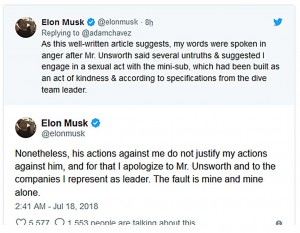
Tesla CEO Elon Musk heads to court this week to defend himself against a suit by British diver whom he described as a “pedo guy” last year.
Tesla CEO Elon Musk has a fondness for tweeting, even though it has caused him some serious problems – including the court case beginning this week about his use of the term, “pedo guy,” to describe a British diver who helped rescue members of a youth soccer team caught in a flooded Thai cave last year.
Hearings begin today in a Los Angeles courtroom in a defamation case brought against Musk by Vernon Unsworth. The two got into a spat over efforts to rescue the members of that team and their coach but things escalated when the South African-born Tesla CEO claimed 64-year-old Unsworth had married a 12-year-old and then described him as a “pedo guy,” a slang term for pedophile.
The case is just the latest incident in which 48-year-old Musk’s itchy Twitter finger has gotten him in trouble. The U.S. Securities and Exchange Commission forced him to relinquish his position as Tesla chairman last year after falsely indicating the carmaker had lined up funding to take itself private. Later tweets almost led to Musk losing his job as CEO, as well.
(Careful what you ask for: Musk sued by diver he disparaged)
The spat between Musk and Unsworth began in July 2018 when rescue efforts got underway to extract 12 teens and their coach from a flooded Thai cave. Unsworth, an experienced cave diver, was lending support to an international team on the scene.
For his part, Musk on July 8 announced plans to ship a mini-sub to Thailand, tweeting, “Mini-sub arriving in about 17 hours. Hopefully useful. If not, perhaps it will be in a future situation.”
The likelihood it could assist was quickly downplayed and, for his part, Unsworth told CNN that is was “just a PR stunt,” adding that Musk “can stick his submarine where it hurts.”
The war of words escalated, Musk following up on July 15 with a tweet – now removed from his extensive archive – calling Unsworth a “pedo guy.”
The Tesla chief was called out by one of his Twitter followers but, instead of backing down, responded. “bet ya a signed dollar it’s true.”
Musk also criticized Unsworth for allegedly marrying a 12-year-old Thai girl. That quickly drew a surprised response from Woranan Ratrawiphukkun, who had been living with the British diver for seven years. While, at 40, she was clearly a good bit younger than Unsworth, she was far from a child.
‘The news about him being married to a 12-year-old child is laughable,” she told a Thai news website, Coconuts.
With Unsworth threatening to sue, Musk appeared to take a step to defuse the situation. He posted another tweet saying, “his actions against me do not justify my actions against him, and for that I apologize to Mr. Unsworth and to the companies I represent as leader. The fault is mine and mine alone.”

Australian Robyn Denholm succeeded Musk as Tesla’s chairman as part of the settlement with the SEC. He remains CEO.
(Tesla CEO Musk lashes out at British diver in latest round of odd behavior)
But Musk soon went back on the offensive. When the issue was brought back up on Aug. 28, by one of the CEO’s Twitter followers, he tweeted, “You don’t think it’s strange he hasn’t sued me? He was offered free legal services.”
In fact, Unsworth had already issued notification that he had hired legal counsel and was considering a lawsuit against Musk.
If anything, the executive raised the tone of the dispute. He e-mailed a reporter at Buzzfeed following the case, telling him to “stop defending child rapists.”
That drew an angry response from Unsworth’s lawyers and, on Sept. 17, 2018, the long-anticipated lawsuit. The diver’s legal counsel, Lin Wood, stating, “Elon Musk falsely accused Vern Unsworth of being guilty of heinous crimes. Musk’s influence and wealth cannot convert his lies into truth or protect him from accountability for his wrongdoing in a court of law.”
Since then, Musk’s own lawyers have tried to get the case tossed out, among other things by using the defense that Unsworth was a public figure. U.S. courts have established precedent that the bar is much higher for politicians, executives and other public figures targeted in cases of libel and slander. But U.S. District Judge Stephen Wilson, who is overseeing the case, rejected that argument and determined that Unsworth is not a public figure.

Musk’s extensive use of social media raised concerns, such as when he had to apologize to a driver involved in the rescue of kids caught in a flooded Thai cave.
For his part, Musk has tried to defend his actions, insisting that the term, “pedo guy” was not what it appeared to many people. Instead, telling the court in a recent filing that it was a “common insult used in South Africa when I was growing up. It is synonymous with ‘creepy old man’ and is used to insult a person’s appearance and demeanor, not accuse a person of acts of pedophilia.”
But the e-mails to Buzzfeed – which will serve as supporting evidence in the lawsuit – and Musk’s decision to hire a private investigator to look into Unsworth’s history – could complicate matters for the Tesla CEO.
Establishing what Musk had in mind could become the critical issue in the defamation case by Unsworth – which has not set a specific monetary target for damages. It will now be up to a jury to decide.
(Denholm replaces Musk as Tesla chairman)
Musk has a huge following on Twitter and industry observers contend he has used that outlet to build momentum for Tesla. But the service has also been a source of trouble for the executive on a number of occasions. In a settlement with the SEC earlier this year, Musk agreed to have any comments that might have a material impact on Tesla stock first reviewed by the automaker’s attorneys.

